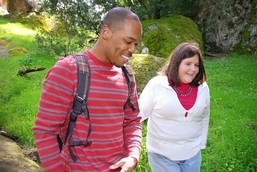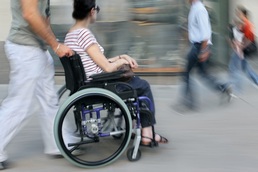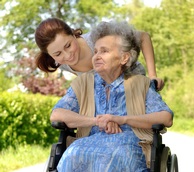Barriers like inadequate parking and uneven floors still preventing disabled people from getting out in the community
 An infographic has been produced by holiday rental company Campaya on the ways people can adapt their holiday property to become more accessible to people with extra needs due to disability.
An infographic has been produced by holiday rental company Campaya on the ways people can adapt their holiday property to become more accessible to people with extra needs due to disability.
Home care providers have also been explaining the importance of helping their service users get out and about in the community and the benefits it brings to their quality of life.
Improving accessibility
People with some sort of impairment or disability make up 27 per cent of the population, with nearly nine million people living with a hearing impairment and around two million people living in the UK with significant sight loss.
With £5.5m spent on the average day by people taking a disabled friend or family member away on an overnight trip, the financial benefit of improving holiday and community destinations is clear.
Information compiled by Campaya revealed that among the most common barriers people with disabilities experience when visiting new places and holiday destinations include inadequate stairways and lifts, parking problems and a lack of help and assistance by a holiday destination or venue’s staff members.
Emma Louise Hartley content manager of Campaya said: “The whole idea behind getting more home owners on board to adapt their properties was simply, there is not enough choice of holiday homes out there for those with disabilities.”
The infographic also revealed 94 per cent of people planning a trip for someone with accessibility needs said the availability of access information forms a key part of their decision whether to go or not.
Only a third of people said finding relevant information on the internet is currently easy.
Ms Hartley continued: “The importance of the whole project is to help open up the accessible market and in turn create more choice. Finding that we are getting more enquiries for accessible properties and not having the numbers to match the demand, shows there is a need for homeowners to take into consideration properties designed and adapted for the disabled.”
 Worldwide issue
Worldwide issue
Campaya is calling for more to be done to improve the situation for people with a disability not only in this country but throughout Europe and the rest of the world.
Ms Hartley continued: “Out of 43 countries we have available, Spain offers the most choice, but the numbers are still low at only 41 classed as accessible from the 5,333 properties available on our database. When you look at the figures, it's pretty shocking.”
Tips on suggested alterations for holiday home owners include widening doorways to ensure wheelchairs can fit through and clearing larger floor space areas in vital rooms such as bathrooms and kitchens to allow free movement for those with extra accessibility needs.
Simple steps such as removing unnecessary obstacles and providing even and non-slippery surfaces for people to walk across will benefit people with a range of disabilities and can be relatively easy and cheap to do.
Ms Hartley said: “I think homeowners also need to realise that they don't necessarily need to go change everything in one go, there is plenty of smaller adaptations that they can do quite easy to start heading in the right direction. It is also equally vital that property descriptions note exactly what is available and what is not.”
Founder of euansguide.com, a website aimed at sharing accessibility information about destinations and places of interest across the country, agreed that simple changes can have a great positive impact on the accessibility of a public venue.
Euan MacDonald said: “We have all been to places where a simple fix could make a huge difference; whether increasing the time that automatic doors stay open, or re-hanging the bathroom door to open out rather than in. It is good for venues to know these things so that they can do something about it.
“I think they are also becoming more aware of the business case for becoming more accessible too. There are 11.6 million disabled people in the UK and there is also a wider network of carers, family and friends. Disabled people, like most others, like to socialise with family and friends and are a source of loyal custom.”
In the community
Helping people with disabilities to feel confident that the necessary accessibility measures have been made allows them to maintain independence and happiness.
One role of some home carers is to help people they are caring for to leave their own home and visit places in their community to prevent them feeling isolated and boost their confidence to live independently.
Bryn Evans, manager of Home Instead Senior Care Sheffield North, said: “At Home Instead Senior Care we deliver companionship as well as personal care so our caregivers are actively involved in making sure our clients get out and about in their local communities.
“It’s really important as it ensures the people stay connected with what’s going on locally and gives them the opportunity to engage with others.”
Some carers can be involved in overnight trips, and others will take time to help people with a disability or mobility issue related to old age visit local areas or even places of significance to a person’s past to maintain their quality of life.
Mr Evans concluded: “For me, staying connected with your local ‘patch’ and mixing and interacting with it is a big part of what makes us human so we encourage our caregivers to get clients out as much as possible. 
Confidence building
“We have clients who are blind and need our assistance to access the local community and public transport. Some of our clients have become anxious going out and we have taken time to gently coax them to venture out and it’s been marvellous for their confidence.”
Another care provider working to help its service users get outside of their own home and into the community is Care South. With visits to places of interest such as community centres, cafes and garden centres, Care South appreciate the necessity of encouraging more local places to become accessible.
Zoe Kelly, domiciliary care operations manager at Care South’s Bournemouth home care office, added: “We help service users with a variety of care needs to get out and about and to stay involved in the community that they love.
“Sometimes it’s just a case of helping a service user to enjoy a walk into town for some fresh air, or to visit their local café for a pastry and a cup of tea. Staff regularly help one of our service users to visit his local market in Christchurch, the aquarium at his local garden centre or accompany him on trips to the Quay to watch people crab fishing, which he really enjoys. These kinds of visits really brighten his day.”
Domiciliary care manager at Care South’s Bath and North East Somerset home care office, Karen Reid, added: “Our staff help lots of our service users to continue to play a part in local community life.
"For instance, we help one lady to attend her local community centre, where she takes part in a range of activity sessions, including arts and craft and even baking, which she really enjoys. Getting out of the house makes such a difference to her and she really looks forward to it. Helping service users to leave the house in this way often gives family members respite from their role as care provider too.”
As more people with disabilities look into ways of getting out and about, whether on day trips or extended holidays away from home, it has never been more crucial to make the necessary improvements to ensure accessibility issues do not prevent people from leading fulfilling lives.
Latest Features News
 28-Nov-19
2019 Election: Labour pledges £10.8 bn for free personal care while Boris Johnson sidelines social care
28-Nov-19
2019 Election: Labour pledges £10.8 bn for free personal care while Boris Johnson sidelines social care
 18-Oct-19
Podcast: Wendy Mitchell and dementia: 'My biggest fear is not knowing who my daughters are'
18-Oct-19
Podcast: Wendy Mitchell and dementia: 'My biggest fear is not knowing who my daughters are'
 30-Sep-19
World's oldest diver aged 96 says 'never accept the fact you are getting old'
30-Sep-19
World's oldest diver aged 96 says 'never accept the fact you are getting old'
 27-Sep-19
Exclusive: Care minister backs care workers' call for time off to grieve and attend funerals
27-Sep-19
Exclusive: Care minister backs care workers' call for time off to grieve and attend funerals
 20-Sep-19
Podcast: Gyles Brandreth urges care workers to learn poetry with elderly
20-Sep-19
Podcast: Gyles Brandreth urges care workers to learn poetry with elderly